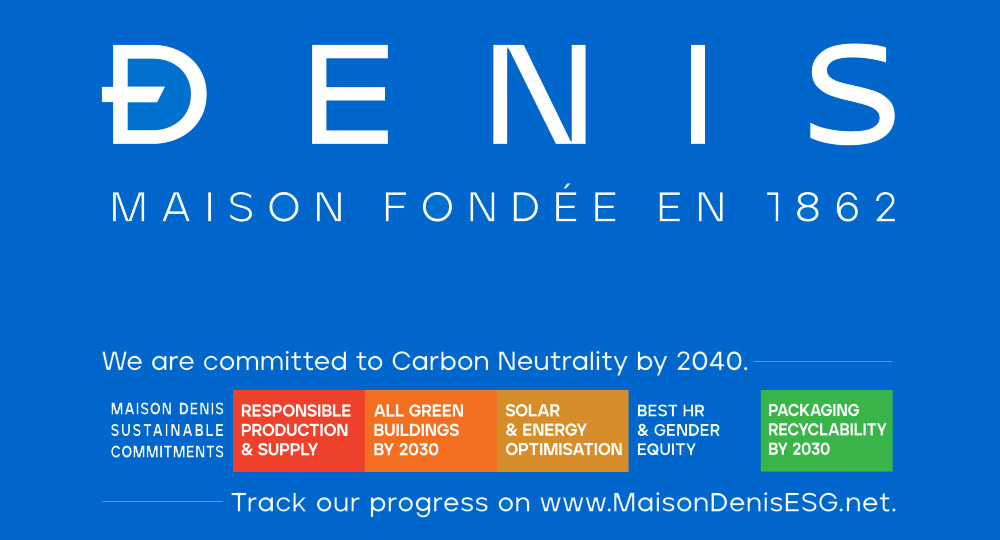
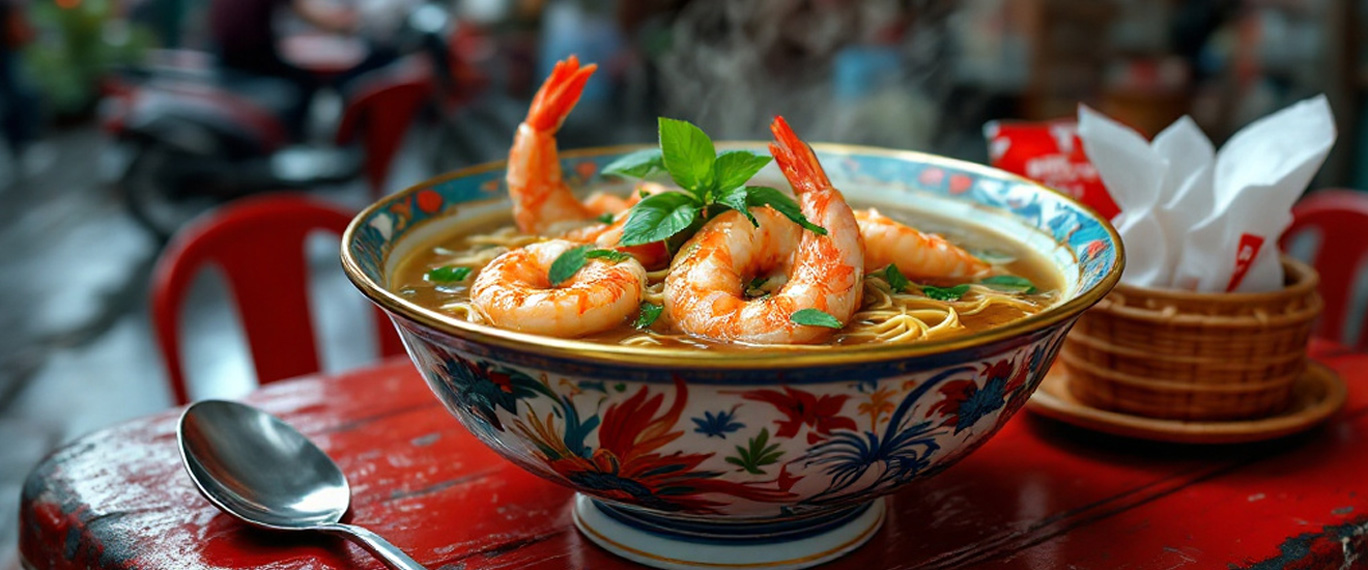
Year 2024
For a wider reach, Google neuronal translation allows the report to be made available in 10 languages. As automatic translation may come with errors, it is important to note that legally, the only valid version is the English text. Use the
As in previous years, the 2024 ESG report was entirely developed through a collaborative international effort by our team. To enhance the 2024 report's effectiveness, we then utilized AI-driven tools with three specific and clearly defined objectives:
Refining language to ensure accuracy and professionalism. Enhancing clarity and readability for a broader audience. Optimizing ESG terminology to align with industry standards and stakeholder expectations.
Following this process, our teams conducted a comprehensive review to ensure that the report's content remained accurate, consistent, and true to its original intent.
Our core product ranges-including pelagic fish (like sardines and mackerel), coconut products, beans, and soy sauces-are among the foods with the lowest carbon footprint. Beyond their nutritional value, food fosters moments of connection, bringing families and friends together in shared experiences. Their report features illustrated recipe ideas showcasing how our products can be enjoyed.
Please note that all food recipe images in this year 2024 report are for decorative purposes only. They have been generated by AI tools using original text prompts created solely by the DAP marketing team, without reliance on any pre-existing images. These AI-generated visuals illustrate ideas for recipes that can be made with Ayam™ or Ayam Brand™ products, but they do not depict actual dishes.
On the cover page, a Yellow Noodle Soup, a recipe that can be made using Ayam™ Yellow Noodles, Ayam™ Soy Sauce, and Ayam™ Fish Sauce.
2024 was a year marked by significant challenges. Ongoing global political and economic instability, esclating climate risks-with 2024 projected to be the warmest year on record-and a complex operating environment have reinforced the urgency of corporate sustainability. At Maison Denis, we recognize that the transition to net-zero emissions is central to the future of business. Leveraging our manufacturing expertise, rigorous quality management, and commitment to product innovation, we continue to build a resilient foundation for sustainability growth.
By embedding ESG into our business strategy, we align our operations with global sustainability efforts. Through clear policies, well-defined targets, and tangible actions, we collaborate with stakeholders to advance our ESG priorities and contribute to a more sustainable world.
Like all responsible businesses, Maison Denis is committed to minimizing its environmental footprint and maximizing positive social impact. We continuously assess our influence on environmental and social resources, striving to create long-term value for all stakeholders.
As custodians fo the company, we set the strategic direction and ensure that sustainability is deeply integrated into our corporate vision. The responsibility for establishing the right tone at the top rests with us, cascading through every level of the organization. Our leadership fosters an environment where sustainability is not just an obligation but a core principle guiding our long- and short-term strategic decisions.
Ourrole extends beyond governance-we champion social responsibility, business value creation, and regulatory compliance. We empower our management teams to define sustainability objectives that align with our business model and broader industry best practices.
Sustainability has long been embedded in the values of the Denis family. Our journey toward a more sustainable future is both a natural evolution and a reaffirmation of our 162-year legacy. We firmly believe that protecting the planet is a shared responsibility, and we take pride in contributing to a sustainable world for future generations.
With a heritage spanning over a century and a half, Maison Denis has the credibility, experience, and strategic foresight to set ambitious yet achieveable ESG goals.
For our family shareholders, sustainability is ultimately about creating a meaningful legacy for future generations-one that balances business success with social and environmental responsibility. This legacy is defined by:
Looking ahead, Maison Denis remains firmly committed to the following ESG targets:
Our sustainability framework is guided by:
The coming year will see continued process on key ESG initatives, including:
As fifth-generation descendants of our founder, Etienne Denis, we are honored to sign this eight ESG report. We extend our deepest gratitude to every employee, partner, and stakeholder whose dedication, innovation, and collaboration drive our sustainability efforts forward. Your contributions make this journey possible, and the recognition of our progress only strengthens our resolve to go further.
Together, we will continue shaping a sustainable future-one that reflects our values, safeguards our planet, and secures our legacy for generations to come.

Daniel Denis
ESG Committee Chairmen

Nicolas Denis
Chairman of Maison Denis SA.
Maison Denis boast a remarkable 162-year legacy, built upon a strong vision, mission, and core values that have ensured its longstanding success and resilience. Today, the descendants of Etienne Denis continue to steer the company, upholding its heritage of innovation and excellence.
Maison Denis derives its strength and stability from three distinct business sectors where it maintains a high level of expertise and innovation:
This ESG report focuses on our Food & Beverages division, which dates back to 1954, when Denis acquired A. Clouet & Co. in Malaya, known for its flagship brand, Ayam Brand. Founded in 1892 in Singapore by Alfred Clouet, Ayam Brand has since expanded into over 30 markets across three continents, earning recognition as the 520th top consumer brand in Asia (Asia's Top 1000 Brands 2021, Nielsen).
Denis Asia Pacific Pte Ltd (DAP) serves as the operational headquaters for this division, consolidating key business functions, including ESG strategy and governance. The ESG reporting scope encompasses the food and beverage operations of three holding entities:
To support its expanding food business, Denis has made significant investments in production and logistic infrastructure:
Denis is strategically positioned to leverage key market trends that will shape the future of the global food industry, including:
We foresee significant growth opportunities, including:
Our ESG Master Plan has progressively evolved to integrate a broader spectrum of operations and sustainablity commitments.
Scope Evolution:
The full list of companies included in this ESG report is published on the next page.
Singapore Holding
Denis Asia Pacific Pte Ltd
21 Tagore Lane
Singapore 787479
Tel: +65 6459 8133
Fax: +65 6459 2867
Companies controlled by this holding:
Australia
A. Clouet (Australia) Pty. Ltd.
11 Melissa Place
Kings Park, NSW 2148
Tel: +61 2 8814 8086
Fax: +61 2 9678 9508
Indonesia
PT. Faretina
Jl. Radin INten II
No. 8, Duren Sawit
Jakarta 13440
Tel: +62 21 8690 0868
Fax: +62 21 8690 1336
Malaysia
A. Clouet (Malaysia) Sdn. Bhd.
(Formerly A. Clouet & Co (KL) Sdn. Bhd.)
19, Persiaran Sabak Bernam
Section 26, 40400 Shah Alam
Selangor Darul Ehsan
Tel: +60 3 5191 1069
Fax: +60 3 5191 1988
Malaysia
D.D.M Sdn. Bhd.
19, Persiaran Sabak Bernam
Section 26, 40400 Shah Alam
Selangor Darul Ehsan
Tel: +60 3 5191 1069
Fax: +60 3 5191 1988
Malaysia
Mafipro Sdn. Bhd.
Jalan Perusahaan Tiga
Kamunting Industrial Estate
34600 Taiping, Perak
Tel: +605-8912704
Fax: +605-8913919
Malaysia
Guinea Foods Sdn. Bhd.
Jalan Lintasan Perusahaan
Kamunting 3, Kamunting Raya
34600 Taiping, Perak
Tel: +605-8911899
Fax: +605-8912899
Singapore
A. Clouet (Singapore) Pte. Ltd.
(Formerly Clouet Trading Pte. Ltd.)
21 Tagore Lane
Singapore 787479
Tel: +65 6459 8133
Fax: +65 6459 2867
Thailand
The Commercial
Company of Siam Ltd.
1168/3-4, 2nd Floor
Lumpini Tower
Rama IV Road, Bangkok 10120
Tel: +66 2 285 6858
Fax: +66 2 285 6830
Vietnam
Denis G.M. Co Ltd.
Lot 17-4, Singapore Tech Park
Ben Cat Town, Binh Duong
Province, Vietnam
Tel: +84 274 357 9798
Fax: +84 274 357 9799
Singapore Holding
SFI Supplies Management Pte Ltd
21 Tagore Lane
Singapore 787479
Tel: +65 6459 8133
Fax: +65 6459 2867
Companies controlled by this holding:
Malaysia
SFI Food Sdn. Bhd.
PT 32730, Jalan Logam 5
Kawasan Perusahaan Kamunting Raya
34600 Taiping, Perak
Tel: +60 5891 8704
Fax: +60 5891 3919
Mexico
BAHIA GDE S. DE RL DE C.V
RFC BGD 070802 TCA
Mision de Mulege 2910 1D - Zona urbana Rio Tijuana
TIJUANA BC 22010 MEXICO
China Holding
Denis China Co. Ltd.
Flat A-5, 11/F, Cheung Lung Industrial Building
10 Cheung Yee Street
Cheung Sha Wan
Kowloon, Hong Kong S.A.R.
Tel: +852-25265986
Fax: +852-28450538
Companies controlled by this holding:
China
Denis Freres (Shenzhen) Co. Ltd.
Unit #605A, 6/F
International Chamber of Commerce Center,
No. 168 Fuhua 3rd Road
Futian District, Shenzhen
Guangdong, China
Postal Code: 518048
Tel: +86 755 8282 2103
Fax: +86 755 8255 7340
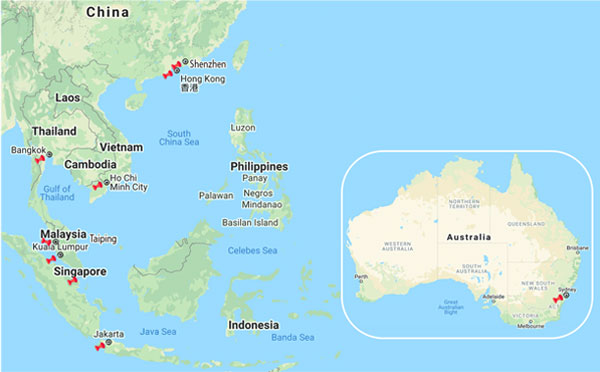
This marks our eighth sustainability report, covering our Environmental, Social, and Governance (ESG) performance for the year 2024.
Since 2021, our ESG reports have been published on a calendar-year basis, with the objective of releasing them within the first three months of the following year.
ESG Committee at the Highest Level of Management
To reinforce our commitment to sustainability, we have established an ESG Committee at the highest level of management. The committee is chaired by Mr. Daniel Denis, Vice Chairman of Maison Denis, with Mr. Nicolas Denis, Chairman, and Mr. Fabien Reyjal, CEO, serving as Vice-Chairmen. Their leadership reflects the long-term commitment of the Denis family, which has owned and guided the company since 1862, toward a durable and sustainable business model.
The ESG Committee is coordinated by Mr. Hervé Simon, Group Marketing Director, and comprises key senior executives across functions:
ESG Committee responsibilities
The ESG Committee, supported by external experts as needed, is responsible for defining the ESG strategy, setting priorities, and overseeing the implementation of sustainability initiatives. It meets regularly to:
Problem-Solving Strategy
With a 162-year heritage, Maison Denis has long upheld strong corporate values. While the company has global operations, it remains a mid-sized enterprise with a lean management structure. This has influenced our pragmatic, solution-oriented ESG strategy, which focuses on:
To formalize this approach
The ESG Committee (refer to page 27) developed a structured ESG Action Plan comprising:
1 - Three long-term strategic commitments.
2 - A set of 10 coordinated sustainability initatives.
3 - A focused approach to five priority Sustainable Development Goals (SDGs) (Refer to Chapter: Our ESG Strategy & Results, page 35).
Unlike large corporations that rely on matrix-based materiality assessments, Denis Asia Pacific Pte Ltd leverages its collaborative work culture and flat hierarchy to prioritize ESG initiatives dynamically.
This agile and hands on approach has been instrumental in executing our first seven ESG action plans efficiently. However, as global ESG best practices evolve, we are preparing to adopt a formal double materiality assessment in the upcoming year.
We are committed to ensuring the accuracy and reliability of ESG data through internal verification processes.
The ESG report is published wihtin three months following the close of data collection period.
It is publicly available without restrictions and can be accessed via multiple platforms:
Company Websites: Denis.com and MaisonDenisESG.com
Issuu Digital Library: https://issuu.com/denisbrands
United Nations Global Compact (UNGC) Website: www.unglobalcompact.org (as a Communication on Progress - CoP)
Multilingual Accessibility: The ESG website leverages Google Neural Translation to make the report available in 10 languages. However, the official legal version remains the English text.
Inclusive Design: Since 2022, the English version includes an audio format to enhance accessibility for visually impaired individuals.
Sustainable Distribution: In alignment with our environmental commitment, the report is only available in digital format, reducing paper waste.
We welcome constructive inquiries related to our ESG initiatives and reporting. For written inquiries, please contact us via email or post:
ESG Committee
Denis Asia Pacific Pte Ltd
Maison Denis Building
21 Tagore Lane
Singapore 787479
(To maintain efficiency, only written inquiries will be entertained.)
| ESG SCORECARD | 2018 | 2019 | 20201 | 2021 | 2022 | 2023 | 2024 |
|---|---|---|---|---|---|---|---|
| Greenhouse Gas emissions Scope 1 (tCO2e)2 | * | * | 6,451 | 6,653 | 7,872 | 7,732 | 6,345 |
| Greenhouse Gas emissions Scope 2 (tCO2e)2 | * | * | 5,864 | 5,768 | 6,269 | 5,926 | 5,163 |
| Grid Electricity consumption (MWh) | 9,337 | 8,559 | 8,912 | 8,827 | 9,542 | 9,127 | 8,054 |
| Solar electricity generation (MWh) | 696 | 1,811 | 1,771 | 1,726 | 1,713 | 1,845 | 1,950 |
| Natural gas consumption (mmBtu) | 68,596 | 70,011 | 80,212 | 80,249 | 93,947 | 87,171 | 63,357 |
| Coal (lignite & bituminous) consumption (tons) | 1,033 | 998 | 802 | 712 | 1,026 | 880 | 713 |
| Water consumption (m3) | 385,625 | 409,270 | 450,659 | 465,487 | 538,691 | 476,586 | 376,571 |
| Water discharged after treatment (m3>) | 284,721 | 295,586 | 347,844 | 359,887 | 414,446 | 364,830 | 281,830 |
| Normal waste to recycling/reusing (tons) | 2,886 | 2,791 | 4,119 | 4,639 | 5,472 | 5,426 | 4,657 |
| Normal waste to landfill (tons) | 434 | 452 | 388 | 334 | 319 | 321 | 246 |
| Percentage of waste Recycled, Reused or Valorized | 87% | 86% | 91% | 93% | 94% | 94% | 95% |
| Hazardous Waste generation (tons)4 | 1.6 | 2.0 | 2.0 | 1.5 | 1.6 | 2.0 | 6.2 |
| Paper consumption (tons) | 10.4 | 10.1 | 8.9 | 6.6 | 6.6 | 5.7 | 5.2 |
| Packaging materials used (tons) | 6,553 | 6,556 | 7,848 | 6,728 | 7,569 | 6,821 | 4,799 |
| Percentage of recyclable primary packaging (in weight) | 99.7% | 99.7% | 99.7% | 99.8% | 99.4% |
1From 2020, addition of China in the scope.
2Historical data can change following the availability and update of emissions factors.
3Excluding probation period and fixed-term contract.
4Larger 2024 definition of hazardous waste in Malaysia.
NTUC FairPrice Sustainable Award 2024
NTUC FairPrice Co-operative Ltd plays a key role in moderating the cost of living in Singapore. Established by the labor movement in 1973, it has grown into the country's largest retailer, operating 230 outlets under various banners, including FairPrice Supermarkets, FairPrice Finest, FairPrice Xtra, FairPrice Xpress, and Cheers convenience stores.
In 2024, NTUC FairPrice introduced a new Sustainability Award, expanding its existing annual excellence awards that recognize outstanding supplier contributions from the previous year. A. Clouet (Singapore) Pte Ltd, our distribution company, was honored with this award for Ayam Brand, demonstrating the effectiveness and relevance of our ESG strategy in Southeast Asia. We share this distinction with globally recognized brands such as Coca-Cola and CP-Foods, further affirming our commitment to sustainable business practices.
«Coup de Coeur» Award - Grand Prix V.I.E Malaysia 2024
We are proud to announce that Florian Deram, ESG Engineer, received the prestigious «Coup de Coeur» Award at the Grand Prix V.I.E. Malaysia 2024. This honor was presented by Axel Cruau, French Ambassador to Malaysia, during the Gala Dinner of the Chamber of Commerce and Industry France Malaysia (CCIFM).
Florina earned this award for his achievements and impactful contributions during his first year in Malaysia. Through his projects, he successfully reduced CO2e emissions by 100 tons and engaged nearly 200 employees om Climate Fresk workshops. His dedication to sustainability was showcased in a compelling video, highlighting his mission, the culture of Malaysia, and the tangible impact of his work.
Discover the video tht earned Florian this recognition: Link
Testimonial

I am honored to have received the 'Coup de Coeur' award at the Grand Prix V.I.E Malaysia 2024. This recognition would not have been possible without the support of the Maison DENIS and its factories. I would like to thank Maison DENIS for offering me this opportunity and for its commitment to tackling climate change. I am also grateful to the various teams across the factories who have supported me and helped bring numerous projects to life with success. Together, we are making meaningful progress towards a sustainable future.
Mr. Florian Deram
ESG Engineer, Mafipro Sdn. Bhd.
Previous ESG Awards & Recognitions
Over the years, our commitment to sustainability has been recognized through several prestigious awards, including:
Denis Asia Pacific Pte Ltd has been a number of the United Nations Global Compact (UNGC), Network Singapore, since January 1st 2016.
A Values-Driven Approach to Corporate Sustainability
Corporate sustainability is built on a strong ethical foundation and a principled approach to business. At a minumum, companies must uphold fundamental responsibilities in human rights, labor standards, environmental stewardship, and anti-corruption. Responsible businesses integrate these values across their global operations, recognizing that good practices in one area do not offset harm in another.
By embedding the Ten Principles of the UN Global Compact into our strategies, policies, and procedures-and fostering a culture of integrity-Denis Asia Pacific is not only fulfilling its basic responsibilities to people and the planet but also paving the way for long-term sustainable development and business resilience.
The Ten Principles of the UN Global Compact
Denis Asia Pacific Pte Ltd is committed to embedding the Ten Principles of the UN Global Compact into its corporate governance framework, ensuring ehtical and responsible business conduct.
These principles are structured under four key pillars:
Principle 1: Businesses should support and respect the protection of internationally proclaimed human rights; and
Principle 2: make sure that they are not complicit in human rights abuses.
Principle 3: Businesses should uphold the freedom of association and the effective recognition of the right to collective bargaining;
Principle 4: the elimination of all forms of forced and compulsory labour;
Principle 5: the effective abolition of child labour; and
Principle 6: the elimination of discrimination in respect of employment and occupation.
Principle 7: Businesses should support a precautionary approach to environmental challenges;
Principle 8: undertake initiatives to promote greater environmental responsibility; and
Principle 9: encourage the development and diffusion of environmentally friendly technologies.
Principle 10: Businesses should work against corruption in all its forms, including extortion and bribery.
Since 2020, Denis Asia Pacific has placed a strong emphasis on anti-corruption initiatives, reinforcing an ethics-first culture across all levels of the organization. In 2022, we launched a mandatory anti-corruption e-training program for all office staff. Details on our anti-corruption framework can be found in the Governance & Ethics section of this report.
Denis Asia Pacific upholds a zero-tolerance policy against:
To ensure compliance, our anti-modern slavery program is detailed in the Governance & Ethics section of this report.
Additionally, all business partners and suppliers are required to:
The implementation and enforcement of our ethical and ESG commitment are overseen by multiple departments at our Head Office:
Denis Asia Pacific is committed to annual ESG disclosure and progress tracking. To uphold transparency, we pledge to:
The Communication on Progress (CoP) serves as the UNGC's official reporting mechanism, allowing participants to demonstrate progress toward the Ten Principles and the UN Sustainable Development Goals (SDGs). Our yearly ESG report will continue to be freely accessible on this platform.
Since 2016, our proactive and evolving ESG strategy has significantly strengthened our understanding of our commitments and long-term vision. To ensure greater engagement and adoption among all stakeholders, particularly our employees, we remain committed to a clear, pragmatic, and results-driven approach.
Our strategy is structured into three key levels:
Our long-term ESG vision, defined by our shareholders, establishes clear milestones that guide the Group's sustainability journey:
Denis Asia Pacific (DAP) is committed to achieving carbon neutrality across its direct operations by 2030 and across its entire supply chain by 2040.
In alignment with the Paris Agreement, we recognize the importance of contributing to the global transition toward net-zero emissions by mid-century. To achieve this, we will:
We acknowledge that achieving carbon neutrality by 2040 is ambitious, particularly as many companies target 2050 or have yet to set a target. However, we anticipate that advancements in decarbonization technologies, evolving regulartory frameworks, collective industry efforts, and scientific progress will accelerate the transition. While defining an exact roadmap remains challenging, we firmly believe that a shared commitment across industries and stakeholders will make this transformation possible.
Buildings have a significant environmental footprint, impacting resource consumption, waste generation, and emissions throughout their lifecycle-from construction and operation to renovation and demolition. Recognizing this, Green Building standards and certification programs have emerged as essential tools for reducing the environmental impact of buildings through sustainable design and operational efficiency.
Since our first ESG Report, DAP has committed to ensuring that all company-owned buildings and facilities achieve Green Building certification by 2030.
We have already made significant progress toward this goal, with 38% of existing buildings certified to date.
We have specifically identified the recyclability of packaging in. We have identified packaging recyclability as a critical component of our circular economy efforts. As part of our commitment, we pledge that 100% of our packaging will be recyclable by 2030.
Achieving this goal requires innovative solutions and material advancements:
We continuously evaluate and refine our ESG initiatives to drive measurable improvements. Our ten short- and medium-term pledges, categorized by Environmental, Social, and Governance (ESG) priorities, outline both existing and new commitments.
(1) Having successfully measured our Scope 1 and Scope 2 greenhouse gas (GHG) emissions since 2020, we expanded our efforts in 2022 to include Scope 3 emissions, capturing all indirect emissions within our value chain (refer to page 59).
(2) We will continue conducting Life-Cycle Assessments (LCA) to identify and mitigate the most significant environmental impacts of our products (refer to page 114).
(3) We will actively work to reduce paper consumption, implementing digital alternatives optimized and usage practices (refer to page 80).
(4) We will enhance supply chain sustainability, prioritizing responsible sourcing, ethical labor practices, and reduced environmental impact (refer to page 98).
(5) To increase consumer confidence and product safety, we will continue improving our manufacturing processes, including the elimination of BPA, enchanced X-ray screening, and stringent heavy metal and radioactivity controls (refer to page 136).
(6) We will continue to set and improve KPIs for our employees, with a specific focus on gender equity (refer to page 123).
(7) We will continue prioritizing workplace safety and employee well-being, including major factory retrofitting projects at Mafipro's facilities (refer to page 101 and 126).
(8) We will actively engage employees in ESG initiatives, integrating sustainability into their daily responsibilities and fostering a culture of contribution (refer to page 73, 132, and 142).
(9) We will continue the implementation of our action plan to emphasize awareness and best practice amongst all employees in the fight against corruption adn bribery (refer to page 154).
(10) In 2024-2025, we will roll out an anti-modern slavery policy, including specialized training for employees who engage directly with external stakeholders, particularly suppliers (refer to page 155).
In 2020, the United Nations expanded the ESG framework by introducing 17 Sustainable Development Goals (SDGs) to guide global sustainability efforts.
Denis Asia Pacific has strategically selected five SDGs that align closely with our ESG priorities and long-term commitments. These SDGs will serve as a framework for our sustainability strategy and provide a clear, globally recognized benchmark for stakeholders.
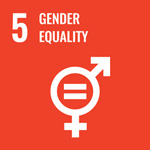
Goal 5: Achieve gender equality and empower all women and girls
Target 5.5: Ensure women's full and effective participation and equal opportunities for leadership at all levels of decision making in political, economic and public life.

Goal 9: Build resilient insfrastructure, promote sustainable industrialization and foster innovation
Target 9.4: upgrade insfrastructure and retrofit industries to make them sustainable, with increased resource-use efficiency and greater adoption of clean and environmentally sound technologies and industrial processes, with all countries taking action in accordance with their respective capabilities.

Goal 12: Ensure sustainable consumption and production patterns
Target 12.6: encourage companies, especially large and transnational companies, to adopt sustainable practices and to integrate sustainability information into their reporting cycle.

Goal 14: Conserve and sustainably use the oceans, seas and marine resources
Target 14.4: effectively regulate harvesting and end overfishing, illegal, unreported and unregulated fishing and destructive fishing practices. Implement science-based management plans, in order to restore fish stocks in the shortest time feasible, at least to levels that can produce maximum sustainable yield as determined by their biological characteristics.

Goal 15: Sustainably manage forests, combat desertification, halt and reverse land degradation, halt biodiversity loss
Target 15.2: promote the implementation of sustainable management of all types of forests, halt deforestation, restore degraded forests and substantially increase afforestation and reforestation globally.
Denis Asia Pacific (DAP) is committed to achieving carbon neutrality across its direct operations (Scope 1 & 2) by 2030 and extending this commitment to its entire value chain (Scope 3) by 2040.
The Paris Agreement has mobilized companies worldwide to take decisive climate action, and our commitment to carbon neutrality is part of the broader effort needed to mitigate climate change. To achieve this goal, we are dedicating all necessary resources and will report our progress annually in our ESG report.
As discussions around environmental commitments continue to evolve-particularly the distinction between carbon neutrality and net-zero emissions-we acknowledge that our pledge was made before the emergence of today's refined definations. However, our commitment remains unchanged, and we are dedicated to a transparent and constructive approach to achieving neutrality through the following key actions:
Through these measures, we not only align with global climate action efforts but also contribute to the transition toward a low-carbon, sustainable future. Our commitment is rooted in proactive, transparent, and collaborative action, ensuring that we uphold our environmental responsibilities while driving meaningful change.
Understanding Emissions: The GHG Protocol
The Greenhouse Gas (GHG) Protocol Corporate Standard categorizes emissions into three scopes:
We conduct an annual assessment of our corporate Scope 1 and 2 emissions to track and manage our carbon footprint. In 2024, total emissions amounted to 11,508 tCO2e, representing a 16% reduction from 2023. This decline was driven primarily by lower production levels and enchanced energy efficiency measures (see «Energy Management,» page 67).
| 2024 | GHG emissions (tCO2e) | Manufacture Malaysia | Manufacture Vietnam | Offices (Asia-Pacific) | Total Emissions | |
|---|---|---|---|---|---|---|
| SCOPE 1 | Fugitive emissions | Refrigerant Gas | 1,160 | 3 | 29 | 1,192 |
| Mobile Combustion | Company Vehicles | 218 | 28 | 215 | 461 | |
| Stationary Combustion | Boilers | 3,378 | 1,314 | - | 4,692 | |
| TOTAL SCOPE 1 | 4,757 | 1,344 | 510 | 6,345 | ||
| SCOPE 2 | Purchased electricity | 4,158 | 494 | 510 | 5,163 | |
| TOTAL SCOPE 2 | 4,158 | 494 | 510 | 5,163 | ||
| TOTAL (SCOPE 1 + 2) | 8,915 | 1,839 | 755 | 11,508 | ||
Our GHG emission intensity increased from 0.55 in 2023 to 0.68 in 2024, mainly due to lower production volumes, despite our continued efforts in energy efficiency.
One notable contributor to this increase was a rise in fugitive emissions, cause by refrigerant leaks in one of our Flake Ice Machine. To mitigate this issue, we:
Although refrigerants represent a small portion of our emissions, leakage remains a high-risk factor with potentially significant environmental impacts. As part of our proactive approach, we will continue to enhance preventive maintenance and leak detection strategies, with updates to be shared in our next ESG report.
In 2023, we completed a full Scope 3 emissions assessment, revealing that 86% of our total emissions originate from our value chain.
While the overall findings aligned with our expectations, a detailed category breakdown provided key insights:
In 2024, we opted not to conduct a full Scope 3 reassessment, as trends remain closely correlated with sales volumes. Instead, we applied a turnover-based emissions ratio, confirming stable levels at 98,246 tCO2e for 2023, with 86% attributed to Scope 3 emissions. This strategic decision allows us to prioritize reductions in Scope 1 & 2 emissions, where we have greater operational control and can drive more immediate impact.
For more details, refer to our GHG Report case study, conducted by Greenly, available at https://greenly.earth/en-gb/case-study/maison-denis.
Since 2017, we have transitioned from 0% to 19% of our grid electricity consumption being sourced from solar energy, marking a significant milestone in our sustainability journey. This shift is a testament to our commitment to renewable energy adoption and carbon neutrality goals.
Our solar energy initiative play a crucial role in mitigating climate change. Annually, we prevent approximately 1,360 metric tons of CO2e emissions, directly contributing to global decarbonization efforts.
To put this into perspective, our emissions savings are equivalent to:
By reducing Scope 2 emissions, we actively lower our carbon footprint while reinforcing our commitment to responsible energy consumption.
Our Denis Great Mekong (DGM) manufacturing site, located near Ho Chi Minh City, has been harnessing Vietnam's abundant solar potential since 2023. The facility is equipped with 700 rooftop solar panels, generating over 1,000 kilowatt-hours (kWh) of clean electricity daily.
This solar energy production supplies 40% of the factory's daily electricity demand, preventing 350 metric tons of CO2e emissions annually.
In memory of our late colleague Cédric Baslé, who made our Solar Photovoltaic project in Vietnam possible.
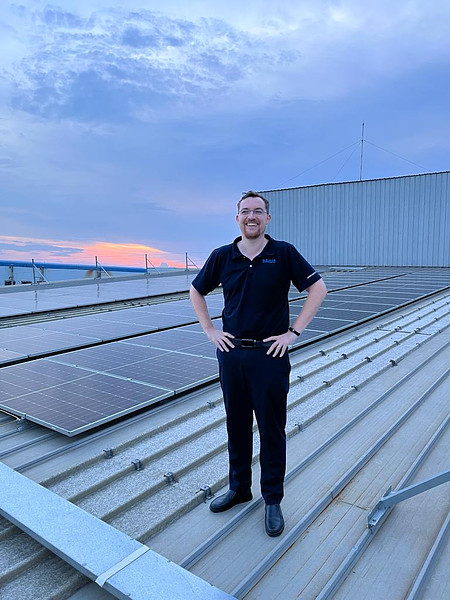
Since 2018, our seven industrial sites in Malaysia have been powered by 1,600 rooftop solar panels, collectively generating approximately 1,700,000 kWh of electricity in 2024. This renewable enery transition translates to an annual carbon reduction of 1,100 metric tons of CO2e.
Watch the video of our solar system at this link: Solar System Taiping
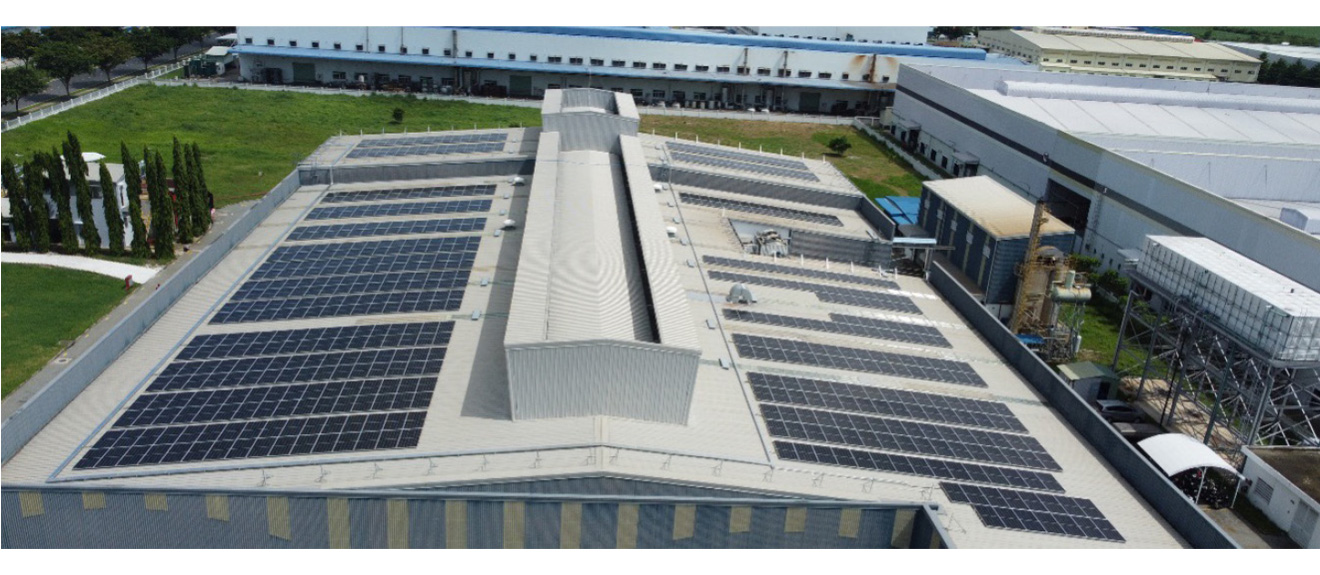
Our solar photovoltaic systems reflect our commitment to corporate responsibility and sustainable innovation. Beyond their technological impact, these initiatives underscore our dedication to operational excellence while prioritizing environmental stewardship.

Reducing greenhouse gas (GHG) emissions is a fundamental step in combating climate change. To achieve this, we are implementing comprehensive Energy Management strategies that not only address present challenges but also lay the foundation for a more sustainable future.
The manufacturing phase, particularly steam production, represents the most significant source of direct GHG emissions in our operations, driven by electricity and fossil fuel consumption. Over recent years, we have integrated advanced technologies and a structured approach to optimize energy use and minimize fossil fuel dependency across our manufacturing sites in Malaysia and Vietnam.
Since 2018, our main production sites in Malaysia have been equipped with electricity meters, providing real-time, granular insights into energy consumption. These meters, combined with our Energy Management Information System (EMIS), enable us to analyze consumption patterns, identify key energy-intensive processes, and develop targeted efficiency strategies. Regular Energy Management Meetings ensure continuous assessment of electricity and natural gas consumption while tracking the progress of ongoing energy initiatives.
Electricity monitoring is a key pillar of our broader Energy Management System (EnMS), supporting data-driven decision-making to enhance overall energy performance.
In 2024, we established an Energy Management System (EnMS) for all our manufacturing plants in Malaysia and Vietnam. This system is designed to enhance our overall energy performance by integrating key components focused of efficiency and sustainability. A fundamental aspect of this initiative involves monitoring and analyzing energy consumption, with a strong emphasis on Energy Intensity. We track several key performance indicators to drive improvements, including:
Through Energy Management Meetings, we analyze consumption patterns and track these performance indicators to enhance energy efficiency across all plants. We have also developed Energy Dashboards to monitor ongoing projects, assess progress, and facilitate data-driven decision-making.
Over the past few years, these initiatives have led to substantial efficiency gains. Our strategic focus on operational optimization, equipment upgrades, and energy audits has resulted in an annual reduction of 823 tCO2e, as detailed in our previous ESG reports. Additionally, our GHG assessments have confirmed that steam generation-primarily reliant on natural gas and coal-is our largest Scope 1 emissions source. To mitigate these emisisons, we have prioritized a comprehensive understanding of our steam usage.
In 2024, we launched a continuous steam measurement initiative to enhance our understanding of steam consumption. By developing mobile steam flow meters across various locations, we identified high-energy-demand equipment and prioritized efficiency improvements.
One key improvement involved installing temperature control valves, replacing the previous practice of continuous steam injection. By regulating steam flow based on real-time temperature data, we have successfully reduced steam consumption, yielding annual savings of 159 tCO2e.
Additionally, we optimized the preheating process of our backup boiler. By refining preheating duration adn frequency, we achieved a further reduction of 1.7 tCO2e per year.
To improve the accuracy of steam mapping, we analyze energy losses within the steam network, including pipe insulation deficiencies, steam leaks, and air purge losses. This assessment has identified multiple opportunities for efficiency gains, particularly in condensate recovery.
Condensates, which remain at 95°C, along with the flash steam generated during cooling, represent a valuable energy resource. At our two Malaysian factories, we implemented a combined condensate and flash steam recovery system, which collects hot condensate and returns it to the boiler feed system while capturing flash steam for preheating. This initiative have significantly reduced natural gas consumption, saving 15.2 tCO2e annually.
In parallel with our steam-focused initiatives, we have implemented multiple electricity-saving projects, including:
These measures have collectively reduced electricity consumption by 6.4 tCO2e annually.
Additionally, our Indonesian office has adopted energy-efficient lighting solutions, including:
These initiatives have resulted in an annual reduction of 0.33 tCO2e.
Looking ahead, we are committed to further optimizing our energy usage. Our roadmap includes additional efficiency measures, expanded energy recovery systems, and the adoption of more sustainable technologies. These efforts align with our long-term objective of achieving carbon neutrality by 2040 through a structured and measurable decarbonization strategy.
At Maison Denis, our Environmental, Social, and Governance (ESG) strategy integrates education as a fundamental pillar of sustainability. By fostering climate awareness among our employees, we strenghten our collective ability to address environmental challenges. This chapter highlights our commitment to climate education through the Climate Fresk initiative.
Climate Fresk, a French nonprofit established in 2018, is dedicated to raising climate change awareness through an interactive, science-based workshop. Utilizing 42 educational cards, participants collaboratively build a «Fresk» that distils the findings of the Intergovernmental Panel on Climate Change (IPCC). By 2024, over two million individuals worldwide have engaged with this initiative, enhancing their understanding of climate science and its implications.
Key Outcomes of Climate Fresk:
Maison Denis launched its Climate Fresk journey in 2023, with our Chairmen, CEO, and Directors participating in the inaugural workshop during our General Assembly. This initiative underscored the critical role of leadership in driving cultural and operational change, setting the stage for broader organizational engagement.
In 2024, participation in Climate Fresk workshops at our Taiping manufacturing sites expanded significantly. Employee engagement grew from 98 participants in 2023 to 219 in 2024, covering 90% of our English-speaking workforce. This expansion reflects our commitment to equipping employees with the knowledge necessary to navigate and address climate challenges.
Workshop Impact:
Fedback from employees highlights the initiative's success:
In 2024, we extended Climate Fresk workshops to our DGM plant in Vietnam, where thirteen employees, including Heads of Departments, participated in a tailored version of the program. Recognizing our diverse workforce, we are also evaluating the training of Malay-speaking facilitators at our Taiping site to ensure broader accessibility and inclusivity.
At Maison Denis, Climate Fresk is more than an educational initiative-it is a strategic component of our sustainability journey. By fostering climate literacy, we empower our employees to take informed actions, aligning with our broader ESG objectives. This initiative underscores our commitment to a culture of environmental stewardship, collaboration, and innovation in pursuit of a more sustainable future.

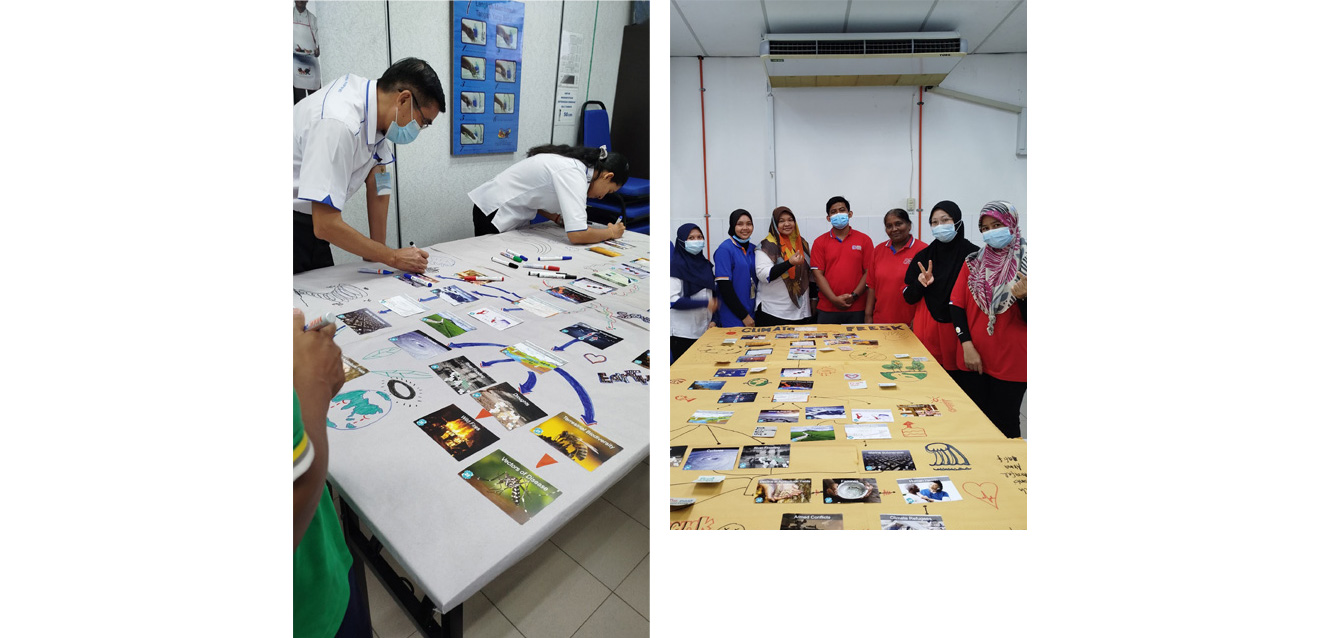
Testimonial
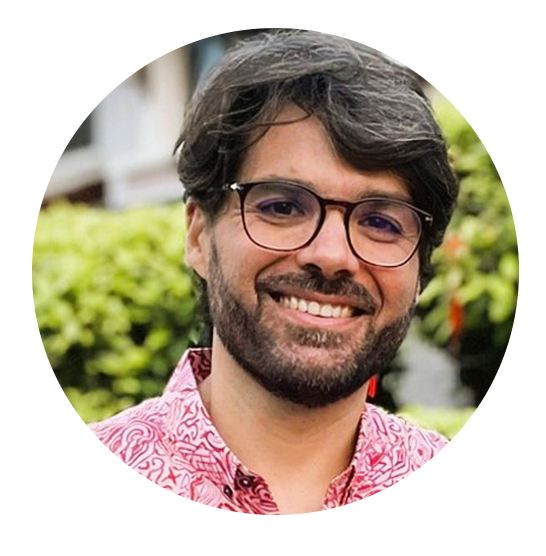
I co-founded the Malaysian chapter of Climate Fresk in January 2023 with the ambition of making high-quality, engaging climate change education accessible to all in Malaysia. Our focus has been to empower local communities, schools, universities, and companies to adopt the Climate Fresk workshop, reaching as many Malaysians as possible and driving meaningful change. This effort is supported by a growing network of volunteer and professional facilitators across the country. Two years later, Climate Fresk Malaysia has engaged over 3,000 participants and built a community of more than 150 facilitators. Maison Denis has been a key partner in advancing climate awareness in Malaysia since the inception of our chapter. In 2024, under the leadership of Florian Deram, the company took a major step forward by engaging over 200 employees at its Taiping facility in Climate Fresk workshops, demonstrating its strong commitment to climate education in the workplace. This initiative exemplifies how companies can embed climate awareness into their corporate culture, driving meaningful change from within. Seeing businesses take proactive steps like this is truly encouraging, and I hope many more will follow suit.
Benoit Rabaud
Country Coordinator for Climate Fresk Malaysia
At Maison Denis, we are committed to responsible resource management, recognizing the finite nature of natural resources and the importance of minimizing our environmental impact. This chapter highlights our efforts in water conservation, waste management, and papar reduction.
In 2024, our operations at DAP consumed 376,510 cubic meters of water, reflecting a 21% reduction compared to 2023. This decrease was primarily due to lower production levels.
To ensure that all discharged water meets environmental safety standard, each of our manufacturing facilities is equipped with a Wastewater Treatment Plant (WWTP). These treatment systems effectively process water to comply with national discharge regulations, ensuring responsible wastewater management.
In 2024, our manufacturing sites generated 4,904 tons of general waste, including packaging materials, rejected products, WWTP sludge, and scrap metal. Of this, 95% was diverted from landfills through reuse, recycling, or recovey in appropriate facilities.
Hazardous waste-comprising oil, batteries, solvents, paints, and chemicals-amounted to less than 7 tons. These materials require stringent handling to mitigate risks to public health and the environment. We ensure safe storage, continous monitoring, and proper disposal through qualified personnel and certified waste management contractors.
In 2024, regulatory changes in Malaysia reclassified certain types of general waste as hazardous waste, leading to a higher reported volume. Specifically, some empty containers now fall under this category, reinforcing our commitment to strict compliance with evolving environmental regulations.
To uphold responsible waste disposal practices, we regularly audit our waste treatment facilities, partnering exclusively with those that meet rigorous environmental, health, and safety (EHS) standards. Our evaluation process recognizes and incentivizes best practices while also supporting smaller entities making progress in sustainable waste management.
In 2024, DAP consumed 5,174 kg of paper, representing a 10% reduction from the previous year. We have ensured that all purchased paper is sourced from sustainable suppliers, holding Forest Stewardship Council (FSC) or Programme for the Endorsement of Forest Certification (PEFC) credentials.
The Forest Stewardship Council (FSC) and the Program of the Endorsement of Forest Certification (PEFC) are organizations that certify forest products, like paper and wood, as being sourced in an environmentally friendly, socially responsible and economically vaible manner.
The continuous reduction in paper consumption has been possible thanks to the remarkable efforts made by our factories in Taiping, Malaysia.
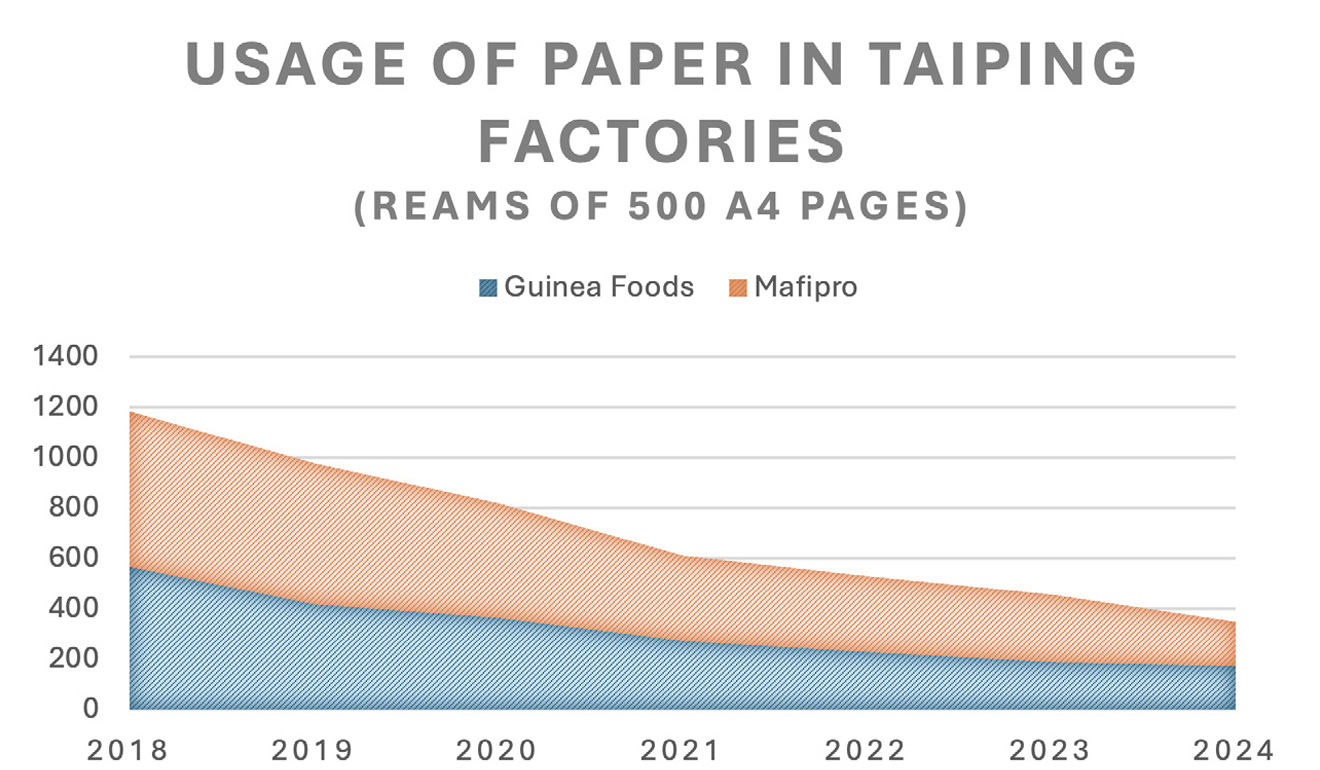
Since our inaugural ESG Report in 2017, we have consistently worked toward reducing paper consumption. Over the past seven years, our factories in Taiping, Malaysia, have achieved an average annyal reduction of 18%, resulting in a threefold decrease in paper use. In 2024, we implemented several initiatives to accelerate this progress:
Testimonial
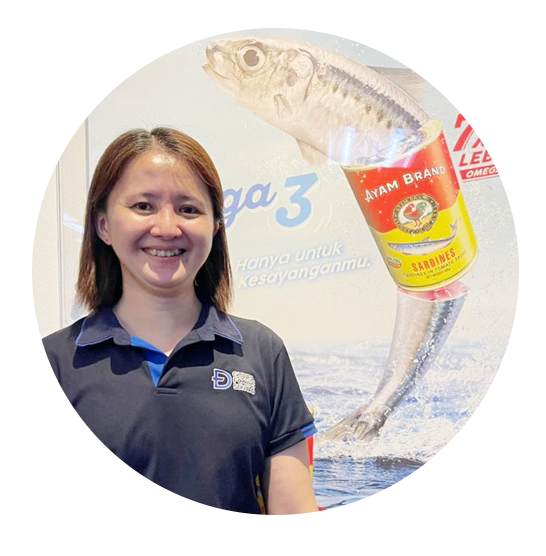
I am proud to share our team's success in reducing paper usage in the Office over the years. Through continuous feedback and raising awareness about responsible printing, we have seen positive improvements from every department. Encouraging digital communication and limiting the issuance of paper have been key steps in this process. This initiative has not only helped us become more eco-friendly but has also steamlined our office processes resulting in greater efficiency overall.
Tan Hwei Theng (Irene),
Admin Manager, Guinea Foods Sdn Bhd and Mafipro Sdn Bhd
We remain committed to achieving our goal of ensuring that all our packaging is recyclable by 2030. To date, we have classified our packaging materials and identified those that pose recyclability challenges, such as pouches. Given the need for these materials to withstand high-temperature sterilization, we are actively exploring solutions using mono-materials and other recyclable alternatives. While our tests with suppliers have yet to yield a fully viable solution, we recognize that progress in sustainable packaging requires persistence and innovation. Our dedicated team continues to work diligently towards this objective.
DAP has been a signatory of the Packaging Partnership Program (PPP) since 2018 and received a Merit Award in 2019 for its efforts in reducing packaging material usage (refer to page 40).
In compliance with Singapore's Mandatory Packaging Reporting (MPR) requirements, we submit an annual packaging report detailing the types and quantities of packaging supplied and used in Singapore. Additionally, we provide an action plan based on the 3R approach (Reduce, Reuse, Recycle), with a strong focus on:
As part of our ongoing optimization efforts, we are currently transitioning from a 3-ply layer pad (used inside cartons to separate product layers) to a single-ply board, significantly reducing packaging weight and improving logistical efficiency.
The Australian Packaging Covenant (APC) provides a national regulatory framework guiding businesses and governments in managing the environmental impact of packaging. APC also leads the National Packaging Targets 2025, which aim for:
Our commitment aligns with these targets while ensuring product safety adn qualiity. The majority of our packaging in Australia is already recyclable, supporting both national objectives and our 2030 recyclability commitment. We conduct annual evaluations against these targets to monitor and transparently report our progress to the APC.
As part of our APC obligations, we are also transitioning all packaging labels from the Mobius loop recycling logo the Australian Recycling Label (ARL), providing clear disposal guidance for consumers. As of 2024, 91% of our labels have been updated, with a goal to achieve 100% ARL compliance by 2025.
Beyond regulatory commitments in Singapore and Australia, we actively implement packaging improvements across all markets.
Progress in 2024 to 8 models adopting sustainably sourced paper.
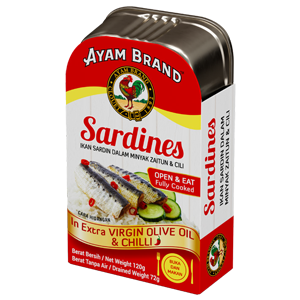

Better recyclability
Rather than using laminated plastic (difficult to recycle), Denis China will position their products in the market with paper-based multi-pack outer box. 157 kg of plastic is avoided.
Paper-Based packaging
Lightweight of carton board quality and reducing carton size. 10 tons of paper.
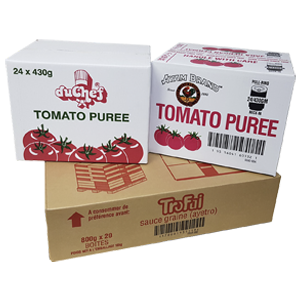

Plastic-Based packaging
Adopt thinner shrinkwrap material from 60 to 50 microns, with equal quality wrap. 437 kg of plastic avoided.
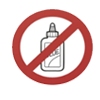
Sealing our cartons only with OPP tape and without using additional glue. Saving 98 kg of glue.

We estimate that 23% of our total greenhouse gas (GHG) emissions are attributed to packaging materials, with cans representing the largest contributor. A deeper analysis of our packaging's carbon footprint highlights two key findings:
While achieving perfect sustainability in packaging remains a challenge, our ongoing initiatives are driving meaningful progress. By continuously improving our packaging practices, we strengthen our role in building a more sustainable food system.
Buildings have significant direct and indirect environmental impacts throughout their lifecycle, from construction and occupancy to renovation, repurposing, and demolition. They consume energy, water, and raw materials, generate waste, and emit potentially harmful atmospheric pollutants. In response, Green Building standards, certifications, and rating systems have been established to mitigate these impacts through sustainable design and operational efficiency.
One of our most ambitious environmental commitments is to certify all DAP-owned buildings and facilities under a recognized Green Building scheme by 2030. This goal underscores our dedication to sustainability and out commitment to fostering healthier work environments for our employees while minimizing the ecological footprint of our operations.
To ensure alignment with regional sustainability frameworks, we adopt the relevant local Green Building certification in each country where we operate. While specific criteria may vary, all certifications share the common objective of reducing environmental impact through sustainable design and efficient resource management.
As of today, we have susccessfully certified six offices and facilities across three countries:
Maison Denis Building, Singapore (Denis Asia Pacific, A. Clouet Singapore and SFI Supplies Management).
A. Clouet (Malaysia), Kuala Lumpur, Malaysia
SFI Food, Logistics Centers, Taiping, Malaysia (SFi Food P1 and SFI Food P2)
Guinea Foods 2, Manufacturing Facility, Taiping, Malaysia
A. Clouet (Australia), Sydney, Australia
Through collaboration with local teams and engagement with various certification programs, we are continuously expanding our expertise in sustainable building solutions. Our teams are leveraging these experiences to implement innovative strategies that enhance efficiency and sustainability across our facilities.
In 2024, we prioritized the certification of our newly retrofitted manufacturing site in Taiping, Malaysia-our largest green building project to date. Registered under the GreenRE Green Building Scheme for Existing Industrial Buildings, this facility has been designed with sustainability at its core. Key innovations include:
This project is ongoing, and we are targeting certification in 2025, in alignment with the commencement of operations. By integrating cutting-edge sustainability measures, we are setting a new benchmark for green buildings within our sector.
All our factories and logistics centers operate in compliance with rigorous environmental management standards, holding ISO 14001 certification-a commmitment we have upheld for over a decade.
Certified facilities:
ISO 14001:2015 establishes the framework for an effective environmental management system, enabling organizations to enhance environmental performance through structured processes. By maintaining this certification across our industrial sites and ensuring successful renewals, we reinforce our commitment to minimizing environmental impact, particularly within production activities.
Our teams continuously strive to meet and exceed annual certification requirements, demonstrating our dedication to sustainability, operational excellence, and ongoing environmental improvements.
As a Fast-Moving Consumer Goods (FMCG) company with a long-standing heritage, we recognize that a sustainability supply chain is fundamental to the long-term resilience of our business and the integrity of our brand. With over a century of commitment to strong values, DAP ensures that our suppliers align with our ethical and sustainability standards.
Our globally recognized brand portfolio demands the highest level of integrity. We take our responsibility seriously, verifying that our suppliers uphold human rights, environmental sustainability, and fair labor practices. We maintain a strict zero-tolerance policy against illicit or unethical activities that could compromise the reputation of our company any brands.
Within DAP's direct supply chain, our Ethics Committee has identified two key areas of concern that are closely monitored by consumers, NGOs, and public opinion: the sustainability of tuna sourcing and palm oil production. These priorities remain central to our sustainability strategy.
Ensuring safety remains our foremost priority throughout our supply chain. As we advance the Taiping Manufacturing Master Plan Project, we are embedding ESG principles into the renovation plan, ensuring that our upgraded facilities enhance operational efficiency while reinforcing our commitment to environmental stewardship and social responsibility.
Since its introduction in 2017, DAP's Supplier Code of Conduct (SCC) has defined our expectations regarding responsible business practices. In 2023, we conducted a comprehensive review and enhancement of the SCC, incorporating six years of experience and aligning with updated governance frameworks, including the UN Global Compact principles.
The revised SCC reinforces DAP's commitments to key ESG areas, including human rights, social governance, anti-corruption, anti-modern slavery, climate change, environmental protection, and resouce conservation.
To ensure effective implementation, we have refined the SCC scope by introducing three screening mechanisms:
To enhance operational efficiency and sustainability, we are implementing a centralized supplier management system. This initiative aims to streamline procurement processes, strengthen supplier relationships, and drive long-term value creation.
A key component of this approach is the categorization of suppliers into strategic and non-strategic procurement groups. This classification allows us to focus resources on collaborative partnerships with critical suppliers while optimizing engagement with less strategic vendors.
By adopting this centralized supplier management approach, we enhance our ability to mitigate risks, promote sustainability, and build a more resilient and responsible supply chain.
The Centralized Fish Processing Plant (CFPP) project, launched in late 2023 as the first phase of our Manufacturing Development Master Plan, represents a major milestone in our ESG journey. This initiative will transform our fish processing operations, delivering significant benefits across three key ESG dimensions:
The CFPP is set to commence operations in May 2025, paving the way for the next phase of our master plan: upgrading and modernizing our packing and canning processes. This continuous transformation of our Taiping industrial center will further reinforce our ESG commitments, driving innovation, efficiency, and sustainable growth.
At DAP, we recognize the critical importance of responsible tuna sourcing in ensuring the long-term sustainability of marine ecosystems and the integrity of our brand. While our tuna business accounts for less than 0.1% of the global annual tuna catch, we remain committed to upholding the highest standards in sustainable fishing and ethical sourcing practices.
As we do not engage directly with fishing vessels, our influence lies in setting stringent procurement specifications for the canned tuna manufacturers we partner with. Through these standards, we actively drive improvements in both sustainable fishing methods and fair labor practices across our supply chain. Manufacturers supplying DAP must adhere to our sustainability criteria, which are structured around three key pillars:
According to the November 2024 International Seafood Sustainability Foundation (ISSF) Statis of the Stocks report, 88% of the global commercial tuna catch originates from stocks at «healthy» levels of abundance, while 2% comes from stocks at an «intermediate level». «Overfished stocks» account for the remaining 10%.
DAP strictly sources only from tuna species classified as not endangered and from biomass classified as healthy-not internediate or overfished.
Data on the biomass situation is assessed by Regional Fisheries Management Organizations (RFMO), international intergovernmental organizations dedicated to the sustainable management of fishery resources in international waters. We follow the Indian Ocean Tuna Commission (IOTC/iota.org) and the Western and Central Pacific Fisheries Commission (WCPFC/www.wcpfc.int) in particular. Most of their data is published by ISSF (Internation Seafood Sustainability Foundation).
Our procurement focuses on three tuna species:
Most of our canned tuna is produced using skipjact tuna. The skipjack tuna used by our brands is caught in the Pacific Ocean, in areas assessed by WCPFC as healthy, but they could come from any other fishing area where skipjact tuna resources are healthy, as assessed by RFMOs.
In 2024, 100% of our skipjack tuna met these sustainability standards.
DAP uses yellowfin tuna for canned tuna in oil or water. In some parts of the world, yellowfin tuna could be overfished. Our requirement is that yellowfin tuna for our brands is fished from the Western Pacific, which is assessed as healthy by WCPFC.
In 2024, 100% of our yellowfin tuna complied with our sustainability criteria.
As we may regularly experience several months without any supply from the Western Pacific, the only solution to maintain this sustainability ratio on yellowfin is to reduce the importance of this species in our production.
We have therefore managed, in about 32% of our supplies, to replace yellowfin by a lesser-known species called Tonggol. In terms of sustainability balance, such as species presents both a benefit and a drawback. On the plus side, Tonggol is a coastal fish caught by local small-scale fisheries. This contributes to the local economy, and this type of tuna is not listed as an endangered species. On the downside, these local species of tuna are not used worldwide by the major industries, therefore there is no official monitoring for their biomass by RFMOs.
While not monitored by RFMOs, our canning factories ensure full compliance with sustainability criteria, including:
In 2024, 100% of Tonggol tuna was sourced from the Western Pacific.
DAP mandates that all Tuna suppliers comply with our Supplier Code of Conduct (SCC), ensuring repsonsible business practices throughout the supply chain. This includes:
We actively engage with suppliers to promote sustainable fishing methods that minimize bycatch and environmental impact:
To ensure full supply chain transparency, since 2022, we have implemented a comprehensive data monitoring system for all tuna production. This system tracks six key data points:
This rigorous monitoring enables full traceability from the fishing vessel to the final retail product, reinforcing our commitment to responsible sourcing and consumer trust.
Through these initiatives, DAP continues to strengthen its sustainable seafood sourcing, fostering a responsible and resilient supply chain that prioritize environmental stewardship, social responsibility, and governance.
Since 2011, DAP has implemented a policy of responsible palm oil use, achieving 100% certified sustainable palm oil within a few years. This commiment is reinforced by the premiumization of our key brands, replacing palm oil with healthier alternative vegetable oils, such as olive oil, wherever technically feasible.
Despite our minimal use of palm oil, DAP upholds two stringent sustainability principles:
Palm oil is present is only a limited number of DAP products. Below are our 2024 procurement figures and associated sustainability certifications:
DAP is a founding member of the Singapore Alliance for Sustainable Palm Oil (SASPO), an initiative led by WWF Singapore. SASPO's mission is to normalize the use of Certified Sustainable Palm Oil (CSPO) to combat deforestation, haze, and biodiversity loss in the region, providing a platform for businesses to transition toward responsible palm oil sourcing.
(www.wwf.sg/sustainability-circular-economy/sustainable-palm-oil/).
DAP's proactive approach demonstrates that medium-sized enterprises can successfully implement sustainable palm oil policies. The increasing environmental challenges of recent years underscore our collective responsibility to eliminate haze and deforestation. Regardless of company size, all businesses must contribute to this essential environmental objective.
DAP has been 100% certified sustainable for palm oil and palm fruit products since 2020, following a structured and transparent sustainability roadmap. Our progress has been recognized in various industry assessments:
Through our long-standing commitment to sustainable palm oil despite being an marginal actor in this business, DAP continues to aim to the highest industry benchmarks for responsible sourcing, transparency, and corporate accountability.
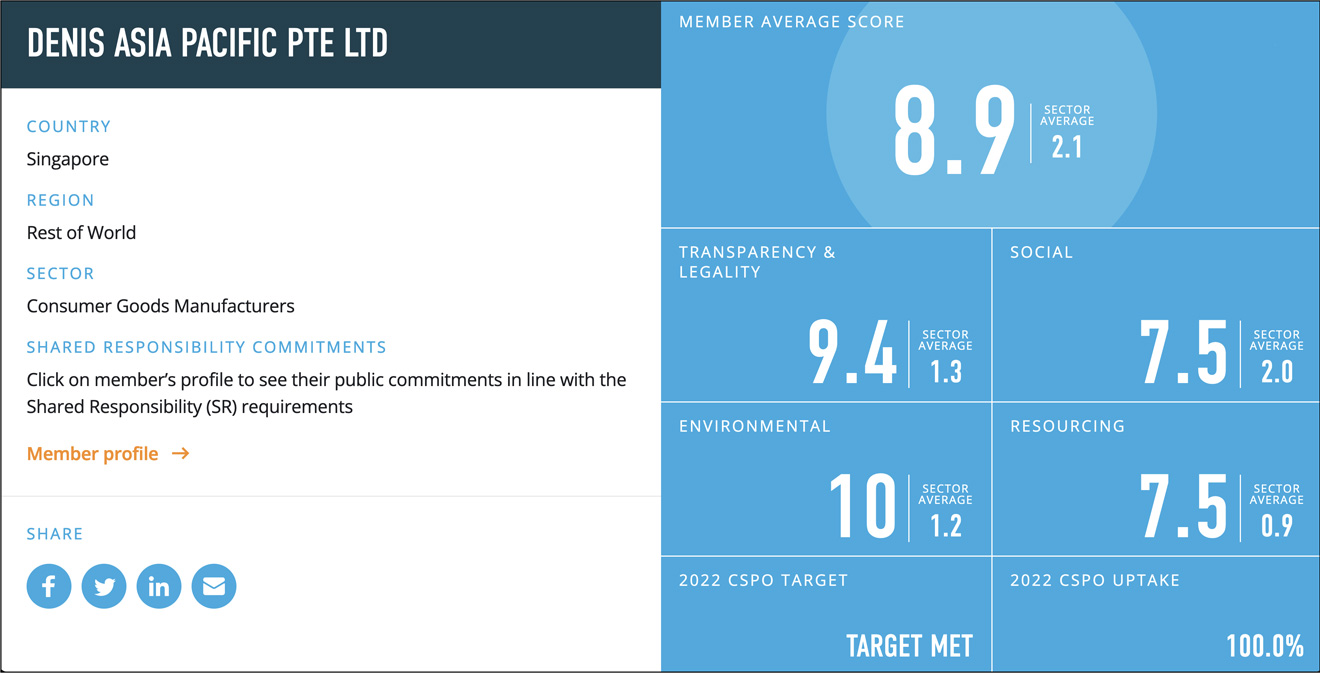
The European Union Deforestation Regulation (EUDR) is designed to combat deforestation by requiring companies selling certain products, such as palm oil, within the EU to demonstrate that their supply chains are free from deforestation and forest degradation. The regulation establishes stringent due diligence requirements, promoting responsible sourcing and greater transparency.
Sustainable palm oil has long been a material focus for our group. Since 2020, 100% of the palm oil used for Ayam Brand™ has been certified sustainable under the Roundtable on Sustainable Palm Oil (RSPO) standards (refer to page 107). However, the EUDR introduces stricter criteria, and we distribute a limited range of products under other brands that do not yet meet the premium certification requirements of RSPO.
To align with EUDR requirements, we collaborate with our suppliers throughout 2024 to enhance compliance through the following key initiatives:
Engaging with suppliers and smallholder farmers to communicate EUDR requirements and promote sustainable agricultural practices.
Establishing a structued verification process to assess compliance and mitigate risks by evaluating:
By proactively working with our suppliers and smallholders to meet EUDR requirements, we prioritize collaborative sustainability over supplier replacement, fostering long-term, inclusive progress within the industry.
Although EUDR enforcement has been postponed, our operations are already compliant, and we remain committed to continuously strengthening our due diligence framework. We are dedicated to sustainable sourcing and advancing deforestation-free supply chains for a more responsible future.
Testimonial
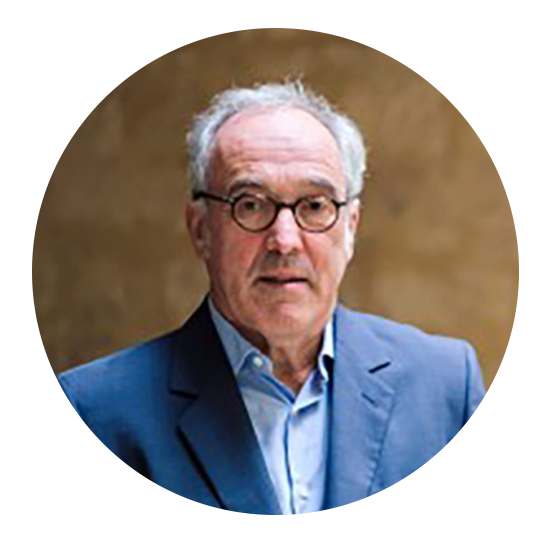
Our partnership with Maison Denis has positively influenced our approach to sustainabiliy. It has enabled us to meet the rigorous standards of the EUDR. Their robust traceability measures and dedication to deforestation-free practices inspired confidence and solidify our shared vision for a greener future.
Philippe GAUTHIER
Racines SA, Directeur Général
To gian a comprehensive and data-driven understanding of the environmental footprint of our products, we began conducting Life Cycle Assessments (LCA) on our core product range several years ago. This rigorous analysis serves two primary objectives:
LCAs provide a holistic view of sustainability impacts, assessing factors such as biodiversity loss, water scarcity, resource depletion, eutrophication, acidification, ozone depletion, land use, and ecotoxicity. By analyzing each stage of a product's lifecycle-from ingredients cultivation to end-of-life disposal (commony referred to as «Cradle to Grave» in LCA methodology)-we generate critical insights that inform our sustainability strategies.
To date, we have completed detailed LCAs for seven of our flagshipp products, which we consider representative of their broader product categories:
In 2024, we expanded our LCA assessments to include additional product categories:
Key Insights from Our LCA Studies
Our assessments have yielded valuable insights into the primary environmental impact drivers across different product categories:
Simplifying Environmental Impact with a Single Score
To enhance transparency and comparability, we are translating complex LCA results into a Single Environmental Score, aligned with European Commission guidelines. This enables clearer benchmarking of our products against sustainability standards.
Our findings confirm that our products rank among the food items with the lowest environmental impact. To reinforce this commitment, we actively participate in the French Green-Score initiative, which aims to provide on-pack environmental labeling for food products. As one of the pioneer companies advocating for environmental labeling in the French food industry, we believe this initiative is a powerful tool to empower consumers in making informed, responsible choices.
The Green-Score system rates food products from A+ to F, with the majority of our product achieving A or B ratings (the highest scores). Only a select few have received a C rating.
Our commitment to continuous LCA assessments remains unwavering. We firmly believe that reducing environmental impact begins with data-driven insights, allowing us to contribute to a more sustainable and responsible global food system.
Denis Asia Pacific (DAP) has established a strong legacy of governance and ethical business practices, upheld consistently throughout its history. The company is committed to maintaining the highest ethical and professional standards while integrating evolving governance and compliance requirements in an increasingly transparent and complex global landscape.
Since 2020, DAP's governance strategy has focused on regional harmonization of best practices, strengthening gender equality initiatives, and enhancing anti-corruption measures.
DAP, including its subsidiaries and affiliated companies, adheres to the highest corporate governance standards. The Board of Directors of Denis Asia Pacific Pte Ltd comprises eight members, including the Group's CEO, who is responsible for strategic oversight, investment decisions, and operational performance. The company emphasizes robust governance practices, inlcuding board composition, director responsibilities, access to information, and transparent shareholder engagement.
Internally, the Governance, Risk & Regulatoryu (G2R) Committee oversees key governance areas through three dedicated sub-committees:
The Board of SFI Supply Management, which consists of four directors-including its Managing Director and three directors from Denis Asia Pacific Pte Ltd-follows the same governance and audit principles.
DAP's Code of Ethics is outlined in the printed employee handbook or accessible via the company intranet when applicable. This code defines the company's commitment to ethical business conduct, regulatory compliance, and responsible corporate behavior.
Zero-Tolerance Policy & Whistleblower Protection
DAP enforces a zero-tolerance policy for severe ethical violations. Employees, suppliers, customers, contractors, and other stakeholders are encouraged to report concerns through 'DG-report.net', a secure and anonymous reporting platform. The zero-tolerance policy and whistleblower procedure are prominently displayed in the employee handbook and on corporate websites.
Reportable concerns includes:
Whistleblowers are protected against retaliation. Reports are assessed by the Ethics Committee, with frivolous claims dismissed and serious allegations subject to thorough investigation, potentially escalating to law enforcement if necessary.
We ensure that this policy is known by all employees through company Handbook and training.
DAP's anti-corruption policy emphasizes training, awareness, and compliance at all levels. Employees are categorized into three commitment levels based on risk exposure:
Corruption and bribery allegations result in immediate suspension during investigation and, if confirmed, automatic dismissal and reporting to relevant authorities. DAP reinforces a strong «tone at the top» to uphold its zero-tolerance stance.
DAP is committed to fight modern slavery, including slavery, servitude, force marriage, forced labour, debt bondage, deceptive recruiting for labour services and the worst forms of child labour. The policy is structured around three pillars:
Testimonial

Australia has taken significant steps in addressing modern slavery, setting a strong example in ethical business practices. At A. Clouet (Australia), we recognize that unethical practices such as, but not limited to, forced labor, deceptive recruitment, or animal welface can sometimes be difficult to detect within complex and sitant supply chains. To better manage these risks and improve transparency, our parent company has established a Supplier Code of Conduct for all approved suppliers, supported by regular audits. We also engage with industry groups to promote responsible sourcing and traceability while providing regular training to employees on identifying and addressing modern slavery risks. We understand that building a more ethical and inclusive economy is an ongoing effort, and we remain committed to playing our part in strengthening ethical business practices within our industry.
Richard Mo
Managing Director, A. Clouet (Australia) Ptty. Ltd.
The Ethics Committee plays a pivotal role in governance, with responsibilities including:
The Ethics Committee comprises shareholder representatives, the CEO, senior management, and at least one independent external expert. Currently, Mrs. Ai Ming Lee (Senior Consultant at Dentons-Rodyk, Singapore Justice of the Peace, Member of the Singapore Public Service Commission's Disciplinary Panel of Persons, the Board of Visiting Jusctices and Board of Inspection of the Singapore Prison Services, and the Singapore Copyright Tribunal, and Independent Director on the Board of Temasek Life Sciences and Lendlease Global Commercial Reit.) serves as the external member, bringing expertise from legal and public service backgrounds.
The Ethics Committee met on Febuary 4th, 2025, to review the 2024 ESG period:
Whistleblower Reports In 2024
DAP received 18 reports through ‘DG-report.net’. A breakdown of findings includes:
Policy Implementation & Training Initiatives
DAP remains steadfast in its commitment to governance, ethics, and sustainability, continuously strengthening its policies and practices to align with evolving global standards and stakeholder expectations.
2024: A Year of Consolidation and Sustainable Impact
The year 2024 was marked by consolidation. with inflation exerting a perceptible impact. As detailed in this report, we maintained our performance despite a slight decrease in production compared to the previous year. This reduction in production led to a measurable decrease in our carbon footprint.
Notably, the reduction in our carbon emissions outpaced the reduction in production, underscoring the effectiveness of our renewable energy capabilities and advanced energy management strategies.
In addition, 2024 saw significant advancements in our governance framework, particularly in strengthening our policy against corruption and modern slavery. These efforts were supported by the full commitment of our employees, reflecting the company's dedication to ethical business practices.
Our latest products' life cycle assessments have delivered outstanding results, demonstrating that our long-term strategic sustainability choices contribute to both long-term environmental responsibility and the resilience of our business model.
Looking ahead, our 2025 sustainability report will integrate a more comprehensie contextual analysis of our business and a refined strategic outlook, leveraging a double materiality matrix to enhance decision-making and transparency.
This progress has only been possible due to the strong commitment of our leadership and the dedication of our employees, whom I sincerely thank. Futhermore, we are witnessing a growing ESG collaboration with suppliers and customers, reinforcing our shared commitment to sustainability.
I extend my gratitude to all employees and partners for their invaluable contributions and dedication to our company's sustainability vision.
Fabien Reyjal
C.E.O.